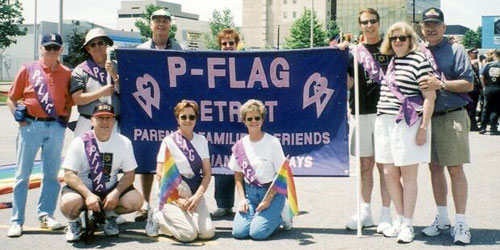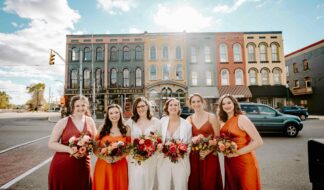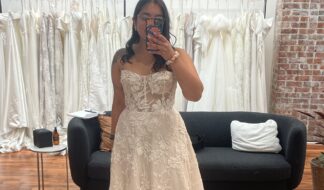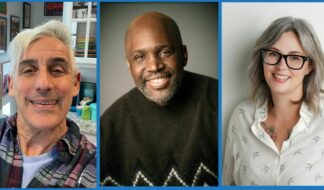By Tara Cavanaugh

During the last 25 years, PFLAG-Detroit has clearly marked its support by attending pride marches across the state and even by posting a billboard on I-75. The billboard was paid for by donations; when PFLAG members Jerry Langdon and Arnold Edmunds held a commitment ceremony, they asked for donations instead of gifts, raising $8,000 to pay for the billboard. Photos supplied by Mike Hazlett, 12-year PFLAG member who creates the monthly newsletter that is sent out to 300 members.
There's something special about a PFLAG hug.
For starters, it probably comes from a perfect stranger. And it's not one of those stilted butt-out hugs, or quick, arm-only side hugs – it's a full-on embrace.
It's a hug that comes from people who know what you're going through and care about you, no matter who you are.
PFLAG stands for Parents, Friends and Families of Lesbians and Gays, and it's a support group with more than 250 chapters in 50 states. Its Detroit chapter is celebrating 25 years of educating, providing community, sharing resources and creating connections.
Or, as the hundreds of members over those 25 years would say: Keeping families together.
The greenhouse effect
When Tony DeOrio, the current co-president of PFLAG Detroit, listened to his then-15-year-old son come out 7 years ago, he was terrified.
"About people bullying him, calling him names, getting in his face," DeOrio says, wincing with the pain of parental concern. "As a dad, you don't want any violence. Certainly Scott can stand up for himself, he's one of those kids. But you don't want him to have to deal with that."
DeOrio was also worried about his wife and Scott's siblings: How would they take it? And what about the extended family?
When DeOrio and his wife went to their first PFLAG meeting, they realized it was OK to have these kinds of worries and doubts. The other people in the support group welcomed them with open arms – literally.
"It's an honest place," DeOrio says. "Where if you felt like you've failed as a parent, or you had some prejudices or homophobias, you can talk about those, still feel love and acceptance, and begin to reorganize that in your heart.
"They weren't pushy," DeOrio says, remembering his first visit. "They didn't say you should believe this or that, or you have to think this way or that way."
DeOrio, a former pastor who now works as a psychologist, says he began exploring how the church views homosexuality before his son came out. "A lot of time religion has been a big part of people's non-acceptance," he says. The PFLAG support groups helped him further re-examine and reframe his beliefs.
So how does PFLAG help those who are struggling to balance their faith with their love for the LGBTs in their lives?
"There's no formula," DeOrio says. "I think one of the ways it happens is by other parents telling other people their story about how they have reframed some of their religious beliefs, how they've worked with that.
"But I think that exchange happens because PFLAG creates like a greenhouse effect. Where you can come, and it's under the right conditions and temperatures, where you can just be yourself and maybe grow into something else," he says.
We are family
PFLAG also helped Jerry Langdon strengthen ties with his family – and find an entirely new one too.
Two decades ago, Langdon was living with his partner Arnold Edmunds and their three children when Edmunds' mother came for an extended visit. One weekday morning, as Langdon was packing lunches and hollering at the children to hurry up, he noticed Edmunds' mother had a "glazed look on her face."
After the hubbub died down, he asked her what was wrong.
"'You guys are like a normal family,'" Langdon remembers her saying – as if it was a bad thing. He knew what she meant: She never thought gay men would also be family men.
After that, Langdon looked around for a support group and found PFLAG Detroit. He, Edmunds and Edmunds' mother went together for their first visit.
"It helped all of us," Langdon gushes 20 years after that first meeting. "Arnold and I didn't hide our sexual orientation, but we were closeted more or less. And we didn't know too many people who had kids, other than straight couples. Our families were OK with it, but we didn't talk about it. We were just there."
PFLAG gave them a place to connect with others and to fully be themselves. And as for his partner's mother? She only attended a few meetings, but then "there was no anti-gay thing going on anymore," Langdon says. "PFLAG changed her and PFLAG really, really changed us."
As Langdon and his partner went from newbies to board members over two decades, they've seen a lot of changes in PFLAG.
One of the biggest changes is in the first-time parents. "The wonderful part is we're not getting them so traumatized anymore," he says. "Once in a great while, we get a parent who comes in really, really, really upset. But most of them come in and say, 'I'm fine with my kid being gay. How can I help them?' It has changed from boxes and boxes of Kleenex 20 years ago to 'How can I help my gay son?'"
Reaching out
Another change Langdon has seen is PFLAG's increase in advocacy. He's particularly fond of the public library project, in which PFLAG bought books and donated them to public libraries throughout the state.
"We did that because a mother couldn't find a book about what a gay person was. The only thing she could find was a book which just defined homosexuality, and that was it," Langdon says.
PFLAG donated books that explained homosexuality in a positive way, such as "Heather Has Two Mommies" by Leslea Newman and "Say Hi to Joyce" by Joyce Murdoch. Langdon also checked to make sure that the books were still there five years later – so that no one had stolen them. They were all there, all 380 donated books.
DeOrio says PFLAG Detroit sends panelists and speakers into college classrooms, high school health classes and churches.
"We'll be there as a panel and the students in the class could ask any question they want. We certainly try to tell people to support human dignity, human rights, embrace diversity, be respectful," DeOrio says.
PFLAG Detroit has also partnered with Highland Park's Ruth Ellis Center, one of three shelters for homeless LGBT youth in the country. Some PFLAG parents even mentor children from the shelter.
DeOrio says what might be his favorite form of outreach is perhaps the most passive one: "I really like our website, http://www.pflagdetroit.org. People go to that website and get a lot of information, and they can still remain anonymous." The site provides links to friendly places of worship, resources for transgender individuals, supportive allies and resources for youth.
That PFLAG hug
The website is also full of testimonials from PFLAG members: Parents of a transgender child who had given up hope, a young transgender woman who appreciates the support, a straight ally who wanted to connect and show his care.
A running theme in the testimonials is the enormous relief at finding a room full of people who will offer a listening ear and a big, warm hug.
"I think PFLAG is a place of healing," DeOrio says. "It's really kept families together."










